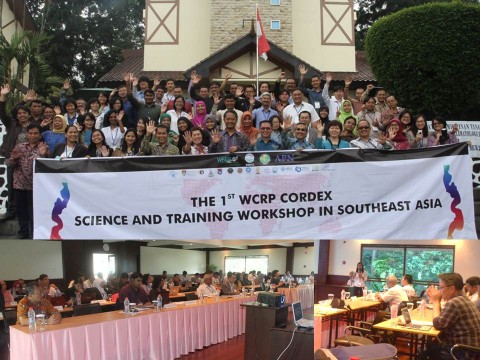The OML Center presented at the 1st WCRP-CORDEX Science and Training Workshop in Bogor, Indonesia

3rd National Climate Conference on Climate-related Risk and Disasters Proceedings Released
December 9, 2016
Focus Group Discussion on Assessing the Linkages between CCA, DRR, and L&D
December 9, 2016The OML Center presented at the 1st WCRP-CORDEX Science and Training Workshop in Bogor, Indonesia

By: Rafaela Jane Delfino
OML Center Researcher, Ms. Rafaela Jane Delfino, participated and presented at the 1st WCRP CORDEX science and training workshop in Southeast Asia on 17-20 November 2014 held at the Indonesian Agency for Meteorology, Climatology and Geophysics (BMKG) Training Center, Citeko-Bogor, Indonesia. The training workshop was participated by young scientists who conduct research in regional climate downscaling and climate change impact assessment. Scientific papers on various topics were presented by known experts and scientists within and outside the region. Ms. Delfino, along with about 70 participants from 12 countries, attended training sessions during the first two days and science workshop on the last two days.
The Coordinated Regional Downscaling Experiment (CORDEX) is a WCRP (World Climate Research Programme) initiative to provide global coordination of regional climate downscaling for improved regional climate change adaptation and impact assessment. In CORDEX Phase I, the CORDEX South Asia and East Asia groups are preparing 50-km products for each area. Through the efforts of and requests from local scientists, CORDEX Southeast Asia was established in 2013.
The training and workshop sessions comprised of lectures and seminars along the following topics (1) evaluation of climate simulations in Southeast Asia region from multiple climate models (seasonal and intra-seasonal variability, Typhoon and tropical cyclone, ENSO, drought, heat wave etc.; (2) assessment of downscaling techniques and their products in Southeast Asia to understand uncertainties accompanying the regional climate projections and to determine the utility of climate model results; (3) meeting the requests of end-users (hydrology, agriculture, water resources, land cover and ecosystem etc.) on downscaled products, with definition of data types, formats and resolutions, for vulnerability, impacts and adaptation analysis; and (4) training on RCMs modeling, data analysis and applications for young scientists from Southeast Asia.
The discussion revolved around different platforms and the caveats of climate modeling and the need for linking climate scientists to impact, vulnerability and adaptation community and policy-making bodies. At the end of the workshop, the following recommendations were adopted: setting up CORDEX Asia statistical downscaling group by linking with CORDEX DS working group; further establish CORDEX Asia end users’ frame by sharing successful experiences; improve capacity building by topic focused trainings; and sharing human & technical resources by collaborations across 3 sub-regions
Ms. Delfino presented the results from the Center’s initiatives specifically the Climate Knowledge Portal for the Philippines as a tool for translating climate and disaster information for decision-making under the realms of CCA and DRM. More specifically, climate information is a key input to the development of climate change adaptation strategies, disaster preparedness and management programs. The Climate Knowledge Portal for the Philippines (http://www.omlopezcenter.org/portal) is just one step in bringing this information to the public. The portal is envisioned to be the bridge that will take us to a well-informed Filipino community resilient to current and future climate. More importantly, the appropriate use of this information must follow. An overview of the Portal and its contents was presented as well as some outputs from the Workshop on Translating Climate Information for Effective Decision-making sponsored by the Center which can provide insights for improving delivery of climate information.
The science and training workshop was jointly supported and organized by the Indonesian Agency for Meteorology, Climatology and Geophysics (BMKG), WCRP, APN (Asia-Pacific Network for Global Change Research), MAIRS (Monsoon Asia Integrated Regional Study), Institute of Atmospheric Physics (IAP), Chinese Academy of Sciences and the National University of Malaysia (UKM).
